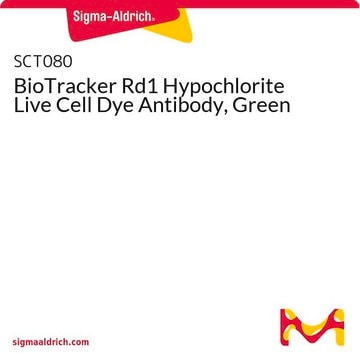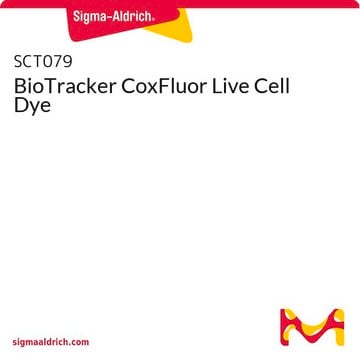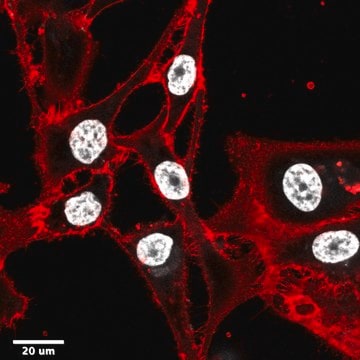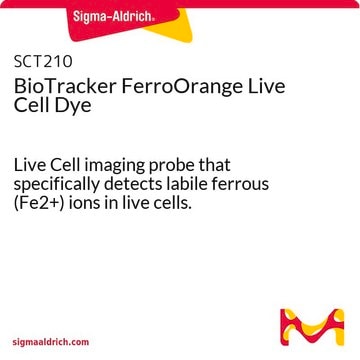Recommended Products
Assay
≥98% (HPLC)
form
lyophilized
mol wt
calculated mol wt 346.1
packaging
pkg of 1 mg
manufacturer/tradename
Millipore
storage condition
desiccated
protect from light
technique(s)
cell based assay: suitable
color
yellow
fluorescence
λex 417 nm; λem 485 nm
detection method
fluorometric
shipped in
ambient
storage temp.
−20°C
General description
Alzheimer′s disease (AD) is a progressive neurological disorder characterized by the presence of amyloid-beta (Aβ) plagues and neurofibrillary tangles. AD is associated with generation of excessive reactive oxygen species (ROS) in the brain, which cause oxidative stress and inflammation. ROS production involves elevated levels of hypochlorous acid (HOCl) and can serve as a potential biomarker of AD pathogenesis along with amyloid plagues.BioTracker Green HOCl-CM2 Live Cell Dye is a switchable coumarin-morpholine (CM) off-on fluorescence probe for the specific detection of HOCl produced and proximally localized with amyloid plaques. The nonfluorescent thioamide probe undergoes regioselective transformation to fluorescent amide probe in the presence of HOCl with high selectivity and sensitivity. This probe has excellent cellular uptake and can penetrate the blood-brain barrier (BBB) enabling detection, imaging, and quantification of HOCl in vitro and in vivo.
Spectral Properties
Absorbance: 417 nm
Emission: 485 nm
Reference:1. Samanta, S., & Govindaraju, T. (2019). Unambiguous detection of elevated levels of hypochlorous acid in double transgenic AD mouse brain. ACS chemical neuroscience, 10(12), 4847-4853.
Spectral Properties
Absorbance: 417 nm
Emission: 485 nm
Reference:1. Samanta, S., & Govindaraju, T. (2019). Unambiguous detection of elevated levels of hypochlorous acid in double transgenic AD mouse brain. ACS chemical neuroscience, 10(12), 4847-4853.
Application
Purity ≥ 98% confirmed by HPLC. Identification confirmed by HNMR, LC-MS, and elemental analysis.
Features and Benefits
Off-on fluorescence probe for the specific detection of hypochlorous acid in Alheimer′s disease studies.
Physical form
Lyophilized. Yellow solid.
Storage and Stability
Store at -20°C, desiccate and protect from light
Note: Centrifuge vial briefly to collect contents at bottom of vial before opening
Note: Centrifuge vial briefly to collect contents at bottom of vial before opening
Other Notes
Live cell fluorescent imaging
Disclaimer
Unless otherwise stated in our catalog or other company documentation accompanying the product(s), our products are intended for research use only and are not to be used for any other purpose, which includes but is not limited to, unauthorized commercial uses, in vitro diagnostic uses, ex vivo or in vivo therapeutic uses or any type of consumption or application to humans or animals.
Storage Class Code
11 - Combustible Solids
WGK
WGK 3
Flash Point(F)
Not applicable
Flash Point(C)
Not applicable
Certificates of Analysis (COA)
Search for Certificates of Analysis (COA) by entering the products Lot/Batch Number. Lot and Batch Numbers can be found on a product’s label following the words ‘Lot’ or ‘Batch’.
Already Own This Product?
Find documentation for the products that you have recently purchased in the Document Library.
Sourav Samanta et al.
ACS chemical neuroscience, 10(12), 4847-4853 (2019-12-04)
Alzheimer's disease (AD) is one of the most prevalent forms of dementia. The current diagnosis methods based on the behavior and cognitive decline or imaging of core biomarkers, namely, amyloid-β (Aβ) plaques and neurofibrillary tangles (NFTs), in the brain offer
Our team of scientists has experience in all areas of research including Life Science, Material Science, Chemical Synthesis, Chromatography, Analytical and many others.
Contact Technical Service








